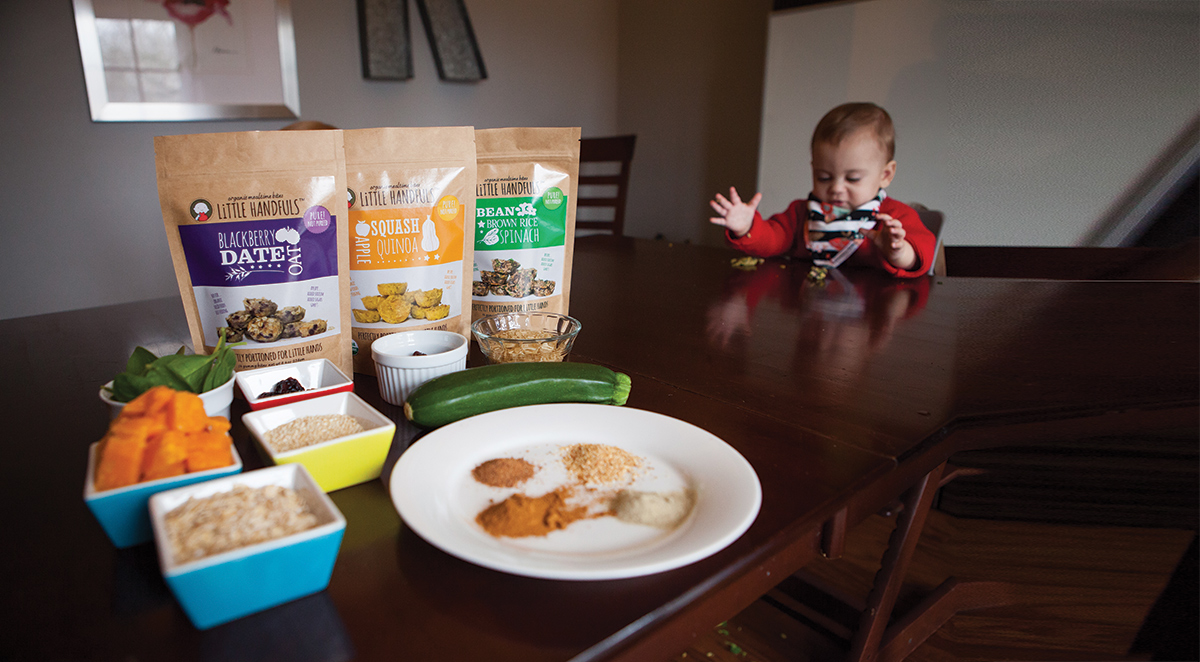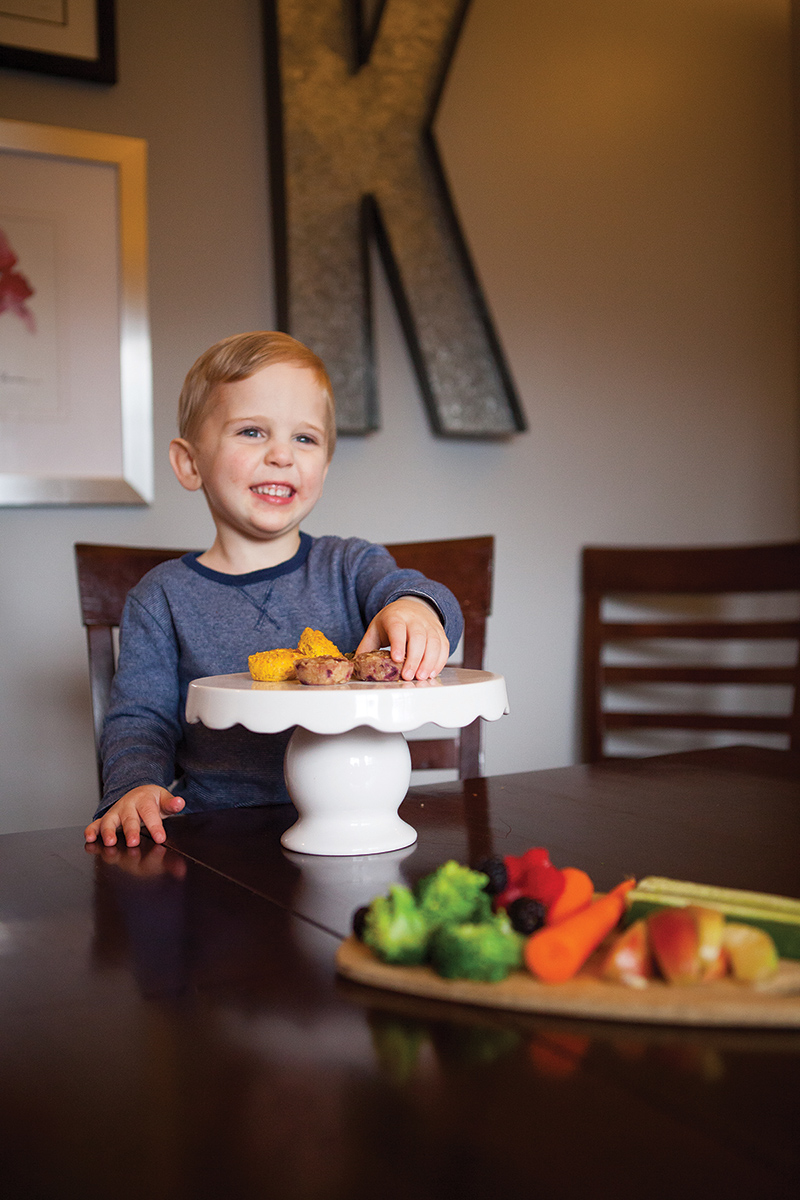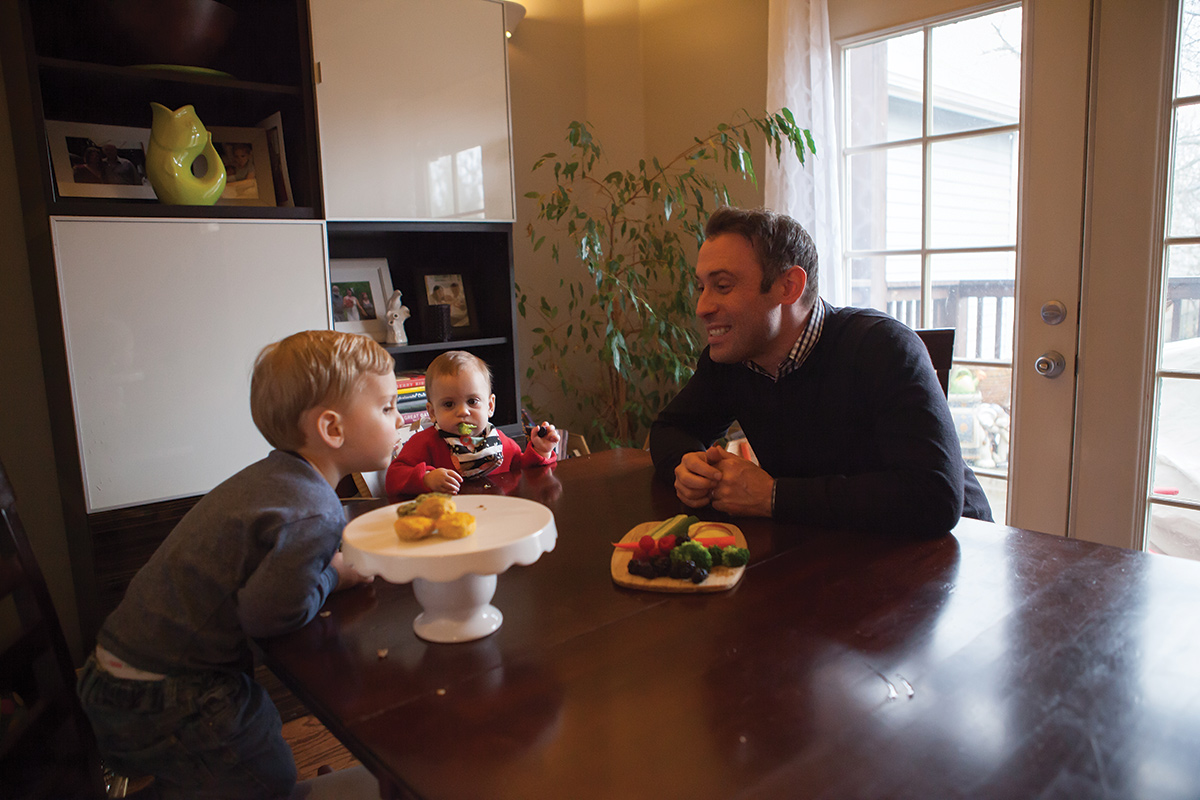Tasting Success

“Don’t play with your food” is a line you won’t hear from Dustin Kochis ’02.
“That’s kids discovering textures,” he said.
Dustin’s son Jude, 3, sits on his knees to reach the dining room table. Scarlet, 1, is strapped in a high chair. Both kids feed themselves, though.
There will be berry-smudged faces, scattered crumbs and strewn vegetables, but a little mess is worth it for Dustin and his wife, Darcy.
The couple have practiced baby-led weaning since Jude was 6 months old. The niche baby feeding approach introduces children to solid foods at about 6 months and allows them to develop oral motor control with self-feeding. At its core, it’s a hands-off, solid-food approach that means no purees and no spoon-feeding.
Dustin and Darcy wanted their children to feel the textures of their food and experience the tastes of natural foods from steamed broccoli and cauliflower to raspberries and blackberries.
“We loved the idea of [our children] being in control and being able to make choices from what was on [their] plate,” Dustin said.
Plus, he adds, it makes it easier for the adults to enjoy their own meals and conversation during dinner time.
The approach isn’t without its challenges. Fruits and vegetables are easy enough, but whole grains can be difficult.
"But that leap of faith was not a blind jump; it took plenty of planning and help."
“At the time, we were making all his food at home, which — being two working parents — that wasn’t always easy,” Dustin said. “That’s when I decided to see what was out there in the stores.”
The answer: not much.
Dustin said his local supermarket in Portland stocked a plethora of the “three P’s,” as he calls them: purees, puffs and pouches. Sometimes, he found a fourth: pizza bites. High in sugar and sodium, these traditional baby foods are plentiful in grocery store aisles, he said.

“I had never been in the baby food aisle before I had kids; it was always the chip or the beer aisle,” Dustin said with a smile. “I thought to myself, ‘There has to be a better option available for those parents that can’t make everything from scratch.’
“We knew we couldn’t be the only ones out there wanting this. From there, we put pen to paper and began scratching out a plan on how we were going to disrupt the current landscape of the baby and toddler food category.”
The result is Little Handfuls Organic, a start-up baby food company that started as weekend experiments in their kitchen and today sells organic baby and toddler food products at grocery stores like New Seasons and Whole Foods throughout the Portland area.
The process started with experimentation at home. Sundays were dedicated to making “Jude food.”
“[We] would mix a bunch of ingredients together, plop them in little mini-muffin pans, and freeze them, because we would end up with a dozens of little bites,” Dustin said.
Jude’s favorite was Blackberry, Date and Oat.
As soon as Scarlet was old enough to join the fun, she took a liking to Bean, Brown Rice and Spinach.
Not the typical “kid fare,” but that’s the point, Dustin said: “They don’t know what they don’t know, so if you start them out on ice cream or sweets, pizza and salty stuff, they’re more likely not going to want that, but if you start them out on herbs and spices and whole grains, they’re gonna grow up knowing that’s what food is.”
In addition to their parenting experience, Dustin and Darcy also each had backgrounds in the food industry. After graduating from Pacific in 2002 with a degree in business, Dustin spent seven years with Frito Lay before helping start up Pirate’s Booty as its western sales manager. Then, he became director of U.S. sales for Kicking Horse Coffee.
Darcy, meanwhile, was marketing director for the Oregon Raspberry and Blackberry Commission.
“With my food background, knowing how to build small brands and Darcy’s food marketing skills, [we knew] we had a chance to maybe do something on our own and that’s when we decided that we’d take that leap of faith,” Dustin said.
But that leap of faith was not a blind jump; it took plenty of planning and help.
They started seeking assistance: a nutritionist for fine-tuning the ingredients, a culinary chef to help with sourcing the ingredients and production, someone to help with design and branding, and, later, an assistant.
“We knew we were making them out of love and what little knowledge we had of cooking, but we don’t have culinary backgrounds or a nutrition background, so from a credibility standpoint, we wanted to make sure that when we were finally on the store shelves, we had that,” Dustin said.
In 2015, Dustin left his full-time job to take on Little Handfuls Organics, starting with the production side and then into brand building. Darcy would later become CEO and head of marketing for their company.

In February 2016, Little Handfuls Organics moved to a kitchen in the Warehouse Café with three flavors: Apple, Squash and Quinoa; Bean, Brown Rice and Spinach; and Blackberry, Date and Oat.
About 14 months after their first conversation about creating a business out of their muffin bites, they sold their first product at the Hollywood Farmers Market in Portland.
Their target? The ones with strollers.
They needed to build an initial customer base and prove that customers would come back for more.
“Until you have that story to share with a retailer like New Seasons, it makes it really tough, so if you can prove your concept with people directly, that helps,” Dustin said. “Not only were we able to get the validation, but we also got feedback.”
Today, Little Handfuls Organics frozen bites are on shelves at the Warehouse Café, at 18 New Seasons locations and at six Whole Foods stores in the Portland and Vancouver area, and Dustin and Darcy are perfecting the product and looking to expand throughout the Pacific Northwest, then farther.
To some extent, the company has become like their third child:
“[Children] are expensive. You invest everything you have into them and the best feeling you get is when you get to see them grow. [Little Handfuls Organics] is still a baby. We’ve got a long way to go, but to get these initial interests by some key retailers like New Seasons and Whole Foods, who are smart retailers and can see a brand that can be successful … it’s something we feel good about,” Dustin said.
“Building a brand takes time, and it takes patience. It’s something I learned in the Pirate’s Booty days: Nothing grows overnight.” ■
1. Don’t rush it.
2. Use your resources. Use your partners and people that can advise you and do the work.
3. Make sure your websites and your social media are well set up.
4. Make sure your finances and financial plans are really well set up so when you’re going into it and you’re selling your first product, you have a good structure behind you.
This story first appeared in the Summer 2017 issue of Pacific Magazine. For more stories, visit pacificu.edu/magazine.


